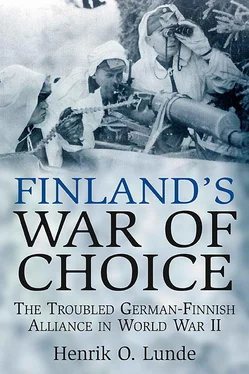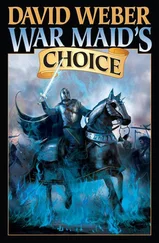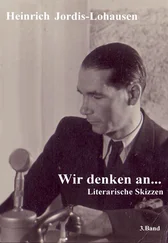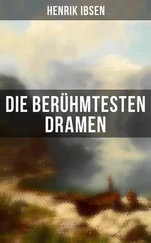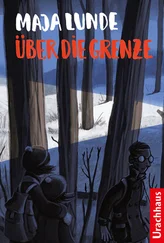Finland also had to agree to extend the railway from Kemijärvi (southwest of Salla) to the new frontier at Salla within a year. The Pechenga area which had been occupied by the Russians was returned to Finland, probably because of the foreign interests in the nickel mines.
The war left Finland with a monumental problem of having to move almost the entire population—between 400,000 and 500,000 people—of the lost territories to other parts of the country. While these included skilled and semi-skilled workers, a large portion consisted of independent farmers. The resettlement operation, which created new homesteads for the displaced farmers, also produced internal tensions. Much of the land on which these refugees were resettled was in the Swedish-speaking area of the country and this caused some difficult situations.
Finally, the ceded territories represented a crushing strategic blow as they “left the country” in the words of Mannerheim “open to attack and the Hanko base was like a pistol aimed at the heart of the country and its most important communications.” 38The border on the Karelian Isthmus and in the Lake Ladoga area was pushed back and had no fortifications. The war had demonstrated that the Finns did not have the manpower to adequately defend the central and northern area of the country. Acquisition of the Salla area and the demand that the Finns construct a railway from Kemijärvi to Salla where it would connect with a line being constructed by the Soviets was alarming. It created an opportunity for the Soviets to quickly penetrate the waist of Finland to the Swedish border.
There is little doubt that the difficulties the Russians encountered in the Winter War had a profound effect on Hitler and his advisers. Earlier respect for the Soviet juggernaut underwent a radical change in some German circles. This is well demonstrated by an interesting letter from Blücher to Weizsäcker on January 11. It illustrates the changed attitude of Germany with respect to Soviet military strength as well as to the Ribbentrop–Molotov Pact:
“…the experience gained in Finland shows that Russia has not for some time past constituted a threat to the great power, Germany, and that Germany already had a safe flank in the east and did not need to make any sacrifices for it.” 39
Hitler and many in the German military seriously underestimated the Soviet Army in the period 1940–41 and their views were surely influenced by that army’s poor performance in the Winter War. “The Russian mass is no match for an army with modern equipment and superior leadership” was the tone of a German General Staff view on December 31, 1939. 40Such views had a major influence on later decisions.
Finland’s Isolation
The German conquest of Norway and Denmark in the spring of 1940 served to further isolate Finland from the rest of the world. The inability of the Western Allies to come to Finland’s aid and their embarrassing performance in Norway seriously eroded their standing as military powers both with the Finnish government and the Finnish people. 41The German defeat of France completed this process and left Germany as the dominant power on the continent. No future assistance would be likely from the British who were expected to court favor with the Soviet Union at the expense of Finland.
Finland’s one remaining port by which it could carry out normal trade with the West was located in Petsamo (Pechenga) and it was separated from the nearest railroad by over 300 kilometers. Importation of food supplies became very difficult and a two-year drought exacerbated this situation.
Another result of the German conquest of Norway was as important as Finland’s virtual isolation from the rest of the world. This was the fact that as of late summer of 1940, German troops had arrived on Finland’s northern border. This did not occur immediately after the capitulation of Norwegian forces in north Norway on June 10, 1940. The status of Norwegian security forces along the border in the eastern part of the Finnmark Province was part of the negotiations leading up to the capitulation. General Otto Ruge, the commander in chief of the Norwegian armed forces, stressed the importance of a continuous military presence along the border (over 600 kilometers from the nearest German units) in order to insure that there were no violations by foreign powers exploiting a vacuum. The Germans accepted Ruge’s suggestion that Norwegian troops continue to secure the border until relieved by German forces. 42
Norwegian troops in Finnmark were slowly relieved by arriving German units over the next five weeks. The transfer of responsibility and the demobilization of Norwegian forces were completed on July 17, 1940.
The changed military situation allowed Germany to put pressure on both Sweden and Finland. If the Norwegians and the Allies had managed to thwart the German occupation of Norway, that fact would probably have kept Finland from joining Germany in its attack on the Soviet Union.
Hitler’s Decision to Deal with the Soviet Union
We have seen that the Soviets took advantage of Germany’s preoccupation in the west to quickly consolidate their sphere of influence in the Baltic region accorded to it in the non-aggression pact with Germany on August 23, 1939. However, the notion that Hitler’s decision to attack the Soviet Union had anything to do with Soviet actions in this region is misleading. Hitler’s attack on the Soviet Union had deep roots in his ideology going back to the early 1920s. His entry into a closer relationship with the Soviet Union in 1939 was a temporary adjustment to his long-range policy. The timing of his attack was based on strategic considerations.
Hitler concluded that Britain’s intransigence was based on their hope of Soviet support and the eventual US entry into the war. He viewed a cross-Channel invasion as too hazardous without having a secure backyard and believed that the British might be more reasonable and come to terms if the Soviet Union could be eliminated from their calculations.
The Soviet Union continued to deliver the food and raw materials arranged for in the economic agreement of August 1939, and Stalin may have increased deliveries if it had been requested by Germany. However, Hitler did not like to depend on something outside his control and in a long war he saw the need for raw materials on a far greater scale than that agreed upon. He felt that it was important to strike while the German armed forces were at peak strength and before his opponents had a chance to strengthen their positions.
Hitler had already decided in July 1940 that he needed to deal with the Soviet Union. His decision was probably influenced by the quick British rejection of the peace feelers floated in his speech to the Reichstag on July 19. Hitler appeared puzzled by British intransigence based on an entry in the diary of General Franz Halder, Chief of the Army High Command (Oberkommando des Heeres—OKH) on July 13. Halder writes that Hitler believed that the British refusal to negotiate must be based on their hope for Soviet assistance and notes that he agreed with Hitler’s conclusion that the Soviet Union had to be dealt with before Britain would become reasonable. However, it is equally likely that Hitler had already concluded that the British would reject a negotiated settlement and that his puzzlement was disingenuous.
It is with these facts in mind that we must view Hitler’s announcement to his military commanders on July 21, 1940 that he planned to attack the Soviet Union that fall. He claimed that Great Britain was inciting the Soviets to take action against Germany by cutting her off from resources such as oil. He anticipated that the forces required to crush the Soviet army could be assembled in four to six weeks. 43
Читать дальше
